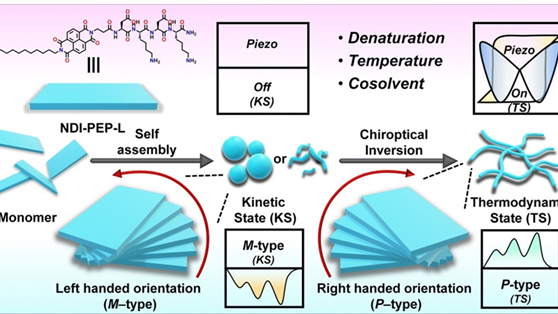

New Delhi, Nov 21:A group of Indian researchers have developed different nanostructures by controlling the self-assembly pathway of the peptides.
This control over the self-assembly process enables the adjustment of material properties in response to mechanical stimuli, effectively enhancing their piezoresponsive characteristics that can be used in energy harvesting, biodevices, soft robotics, flexible electronic and sensing devices.
Self-assembly of peptides, technically called supramolecular self-assembly, involves the spontaneous organization of small molecules into larger, structured formations driven by non-covalent interactions. This process is fundamental for creating nanodevices used in fields like electronics, optoelectronics, and biomedicine, where precise molecular control is crucial for performance.
Piezoelectric materials have the unique ability to generate an electric charge when subjected to mechanical stress. This characteristic makes them ideal for applications in sensors, actuators, and energy-harvesting devices, where mechanical energy is converted into electrical signals or vice versa.
Combining supramolecular self-assembly with piezoelectricity offers a powerful approach in designing next-generation nanomaterials with dynamic and customizable properties. This innovation not only enhances the functionality of smart materials but also paves the way for breakthroughs in technology and material science, driving progress in various fields from healthcare to electronics.
Researchers from the Centre for Nano and Soft Matter Sciences (CeNS), Bengaluru, in collaboration with the researchers from Jawaharlal Nehru Centre for Advanced Scientific Research (JNCASR), Bengaluru, both autonomous institutes under the Department of Science and Technology (DST), have revealed a complex interplay between kinetic and thermodynamic states in the supramolecular self-assembly of peptides by manipulating multiple parameters including temperature and solvent compositions. This complexity plays a crucial role in determining the final structure and properties of the assembled nanomaterials.
The controlled self-assembly process allowed precise manipulation of molecular arrangements, leading to organized and asymmetric structures in the nanomaterials. This structural asymmetry is essential for introducing piezoelectric properties, as it enables the material to generate an electric charge in response to mechanical stress.
This tunable piezoelectric behaviour of the self-assembled peptide-based nanomaterials has been recently published in the journal of Chemical Science by the Royal Society of Chemistry which opens new possibilities for designing materials that can be precisely controlled at the molecular level.
The study by Dr. Goutam Ghosh, CeNS and his student Aparna Ramesh along with Tarak Nath Das and Prof. Tapas Kumar Maji from JNCASR also observed switching of rotation of polarized light in a particular direction (chiroptical) during the denaturation process of peptides, upon heat treatment or thermal annealing and upon increase in the amount of cosolvent ratios which is a rare phenomenon.
They further illustrated that these findings were linked to structural changes that can directly impact the formation of nanostructures (nanoparticles and nanofibers) when various factors are altered. The researchers showed that these nanostructural modifications, triggered by chiroptical switching, can produce peptide-based tuneable piezoresponsive nanomaterials that respond to mechanical stress. This dynamic control over material properties paves the way for designing smart materials with customized functionalities.
Supported by the ANRF, erstwhile Science and Engineering Research Board (SERB), this study showcases the innovative approach of controlling piezoelectric properties in nanomaterials could lead to significant advancements in various fields, including sensors, energy harvesting devices, and biomedical technologies. The ability to dynamically tune material properties in response to external stimuli holds great promise for creating next-generation devices with enhanced efficiency and versatility. Their study not only advances the understanding of supramolecular self-assembly but lays the groundwork for future innovations in material science and technology. This work is expected to inspire further research and development, paving the way for the next generation of smart materials and nanotechnologies.